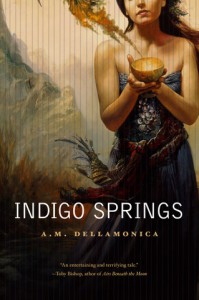Whether a piece of fiction ‘works,’ as we sometimes put it, depends both on the storytelling and on the line by line writing. In some ways, it’s problematic to view them as separate issues: if I decide a writer’s dialog lacks sophistication, for example, I might as easily talk to them about characterization as about their writing style. It all overlaps: I might find myself talking about why a story’s protagonist is so passive, for example, and then think, “Well, their behavior is caused by the rules of their setting… maybe I should address that.” And on we go.
Even so, it is often easier to try to talk about one story element at a time, and at least once in each of my Novel Writing workshops at UCLA, I shine the spotlight on prose. With that in mind, I had been trying, earlier this week, to come up with a sort of hierarchy to impose on the question. You know the kind of thing I mean: “Beginner,” at the bottom. “Professional Quality” in the middle. “Incandescent” at the top. With stages in between.
That proved beyond me, and I’m not sure it’s possible, but what I have done is think through a number of positive qualities that I look for in prose, things I think I might usefully employ to explain where a writer might focus their attention:
First, I kept Professional Quality: What this would mean, strictly in teaching terms, was that the line by line writing is smooth enough that were I an editor and if the piece in question worked as a story, I’d buy it. I think it’s important for a writer to know if they’re at or above this line.
(The rest are in no particular order).
Graceful: What I mean by graceful is that each event or action flows into the next, without there being a lot of clunky stage directions. Things like a whole pile of “S/he looked at him and said ___.” Glaring back at her, he replied, “____.” In a similar vein, grace would also mean characters move physically about the setting in an easy fashion. We don’t need to see them get up, get coffee, go to job if the story starts at job. The boring bits are gently shuffled offstage and we find ourselves comfortably entering each scene at an interesting moment.
Smooth: The general phrasing is good and the word choices have specificity. Strong verbs are chosen in place of adverbs, passive verb constructions, and said bookisms.
Clear: Simply put, I know what’s happening.
Sensual: Evokes the senses. I can imagine the scene; ideally, I feel like I’m there.
Sophisticated: For me, this means there’s starting to be some play with language, turns of phrase that at once capture ideas and images clearly and yet do it in surprising ways. The language illuminates things I’ve never considered before.
Maturity: This one feels as though it’s still a little dicey. It refers, essentially, to the emotional content of the story. I’m trying to get at the sense we get that the author understands that life is complicated, even when a particular character in his or her spotlight is maybe a bit simple-minded. I’m thinking about how it’s obvious Jane Austen doesn’t have the same good opinion of Mister Collins as she does of Elizabeth Bennett.
Transparent: By transparent, I mean nothing about the writing snags my attention, for good or ill: even if it might be low on beauty or style, it immerses me in the story; it doesn’t get in my way. I’m not noticing errors or clunky transitions. I’m just reading.
Grammatical: Either the piece is written in accordance with the rules of English grammar–not in a complete, perfect, uptight way, but in a way that doesn’t impact its transparency–or the author’s language is ungrammatical in a way that’s deliberate, appropriate and has some kind of consistency.
Balanced: There is a pleasantly readable mix of narrative, dialog, description, action. The prose isn’t all one thing.
Variable: The writer has slow and fast-paced passages. Their sentences are sometimes short and simple, sometimes long and complex. The characters don’t all speak identically. The writer can do a number of different things with relative ease.
Aesthetically pleasing : The writing in and of itself has some aesthetic impact. Obviously what one person considers beautiful may not resonate with another reader, but the sentences are put together in a powerful way–they sound good read aloud, they have strong rhythms. This is prose with the capacity to surprise, to bring a laugh, to provoke.
Confident: This one, again, seems hard to quantify. The writer can convey the setting or other information in a way that makes us believe it. They can tell us what their POV character is experiencing without always prefacing it with something like: “He saw.” If they leave a question dangling, it is done in a way that reassures readers this is intentional, and answers are coming, rather than a mistake. There’s no sense of hesitation or apology.
Streamlined: Here, I’m looking for a way to say “Not Wordy.” The need for explanation or repetition is minimized because there’s clarity–you know what’s happening the first time something’s said–and it makes sense. The flow carries the reader along, without wearing them out.
Individual: The writer is developing or has developed a voice that’s unique to them and their work. There are many who say you can’t teach voice. I don’t know if this is always true, but for the most part I prefer to stick to urging my students to get their prose up to that professional level and then build up more and more confidence. My hope is that someone who’s steadily improving on the above will in time start to take chances… and their voice will develop as they do so.
So here’s my question: assuming the above definitions were nice and clear, and maybe came with examples, how useful would it be to get a crit that said something like:
You are getting close to pro quality here, and there’s good balance between narrative, dialog, etc., but the areas where your writing isn’t transparent fall in the areas of grace and confidence. You have your characters eyeballing each other a lot, for example: you use “he scowled at X” to ensure we know who’s speaking to whom, and when you describe the Whoozification process, I can’t tell if that’s really how it works or if the character just thinks so.
About this post: I post writing-related advice and other information for students, fans and anyone who’s interested in the process of fiction-writing on my site. A few of you who enjoy these essays have, very kindly, asked if I have a donate button or something similar. I don’t, but you can always support my writing and teaching by buying books and stories, like this one.








